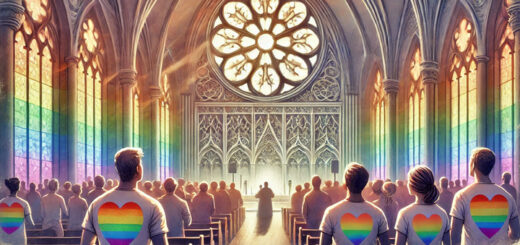The Catholic Church and Homosexuality. Open Letter to the Archbishop of Florence
Open letter distributed and signed by some parishes and Catholic communities in Florence (Italy) September 2012, translated by Peter L.
This way of profoundly welcoming the life of each and every human being, this is something we learned from the Church. For disciples of Jesus, it is not so much about defending principles, rigorously guarding them, like angels with a sword of fire before the tree of life; rather, it is about ‘looking into’ the lives of women and men of our times, in order for them to progress towards fullness. It does not entail being faithful to a God who is known and possessed, but to a God who ‘is coming’. Jesus said: “Hypocrites! You know how to interpret the appearance of the earth and the sky. How is it that you do not know how to interpret this present time?” (Luca 12:56)
It seems to us that it should be from the (Catholic) Church should itself that a new way of understanding homosexuality comes, with a sign of welcoming and profound respect for the love felt by people who personally live out this orientation.
Two people who love each other are not an attack on society nor are they a betrayal of the Gospel. Scandals should be looked for elsewhere.Referring partly to these Biblical sources and partly to the human experience we know as we live out every day with these people, we feel that it is a natural and a Christian response to welcome these different forms of love in full communion. We feel that they are an integral part of our journey of life and faith, and that with them, as with all others, we can participate in sacramental Communion and community life.
The Book of Wisdom (11:24-26) offers us a wonderful trait of the Creator, who should be the ‘light along our way’: “For you love all the things that are, and abhor nothing which you have made: for never would you have made anything, if you had hated it. And how could anything have endured, if it had not been your will? or been preserved, if not called by you? But you spare all: for they are yours, O Lord, you lover of souls.”
Fr. Fabio Masi, Fr. Alessandro Santoro, Fr. Giacomo Stinghi, Sister Stefania Baldini
September 2012
FULL TEXT OF THE OPEN LETTER
“The issue of ‘Toscana Oggi’ dated June 24, 2012 reserved generous space to the topic of homosexuality and heterosexual civil unions with several articles and letters to the Editor, which were critical of the Church’s official position on the topic. We believe that the articles printed in the Diocesan weekly publication (Toscana Oggi) do nothing but repeat existing ecclesiastical positions on homosexuality, without providing any insight on a topic that has been considerably developed and explained in recent years, and which requires more research.
Our letter testifies to the fact that there is diversity of positions regarding this issue today, both in secular thought and in our churches themselves. We, along with various theologians, bishops and Christian laypeople, do not see our viewpoints represented in Toscana Oggi’s treatment of this issue through its articles.
What has brought about a radical shift in the understanding of homosexuality has now signaled a very important journey. In the past, homosexuality was considered a ‘vice’ practiced by ‘heterosexual’ people searching for alternative forms of pleasure and, as such, it was condemned. But, in this context, one spoke solely of ‘homosexual behavior’; only in the last century did people begin to speak of a ‘homosexual condition’ and not just of ‘acts’, inducing some to hypothesize that homosexuality was not to be considered a vice, but an ‘illness’.
In recent years, a radically different way of understanding homosexuality has emerged and homosexuality has become accepted by nearly everyone in various ways and with different nuances. Homosexuality is now spoken of as a pervasive element of an individual, one that characterizes a person’s most profound identity and one that leads them to live their sexuality in a different manner.
It is important for the Church to recognize the progress made in the science of understanding humanity in a positive manner and to refrain from making absolute declarations which she will then have to admit are mistaken, as has happened in the past. These developments lead us to see homosexuality in a new light and to deal with it under a different moral perspective. On this topic, the Bible does not, nor could it, say anything, simply because it was not known, just as it says nothing about ecology or use of the atomic bomb.
In Biblical culture, as in all of antiquity, the idea of a ‘homosexual person’ is completely absent; only ‘behavior’ is spoken of, not a ‘homosexual orientation’. And it is clear that behavior is condemned not only because it is not procreative, but also because it is linked to violence or religious prostitution.
In this regard, a few notes may be useful on Holy Scripture passages that are often cited to stigmatize homosexual relations. In the New Testament, only Paul calls homosexual relations ‘unnatural’ (Romans 1:26-27); however, one must consider that he referred not so much to physical aspects, as to homosexuality undermining the accepted social order of the times, when it was woman who, by nature, was to be ‘submissive’ to man. Our very idea of ‘nature’ itself has changed since Paul’s times: the idea of ‘nature’ as finished reality no longer corresponds to contemporary understanding.
It has also become quite clear that some Old Testament episodes, which continue to form a basis for condemning homosexuality, actually had a different meaning. In the episode of Sodom (Genesis 19) and a similar one in Gabaa (Judges 19), the crime was not so much in homosexuality itself, but in the will to humiliate and refuse a foreigner.
On the other hand, the Old Testament offers us some beautiful and very important signals that do not refer to homosexuality explicitly, but that do refer to the journey of maturity that the Jewish people undertook in the respect of marginalized groups and individuals. In this sense, the Bible offers us a wider frame through which we may also place this aspect of life.
God ‘chose’ the people of Israel so that, in the midst of other peoples, they might be a sign of His will for justice, that He wants to save all His creation. With an illusion of always being more up to God’s mission, within Israel other ‘choices’ were then made to marginalize groups considered ‘impure’.
In Deuteronomy, for example, (23:2-9) there is a list of categories of people who are to be excluded from religious services: eunuchs, bastards and foreigners. However, a journey towards Messianic times is a journey towards inclusion, because Messianic times are for all, as can be read in Isaiah (56:1, 3-5): “Maintain justice and do what is right…..
Let no foreigner who is bound to the LORD say, ‘The LORD will surely exclude me from his people.’ And let no eunuch complain, ‘I am only a dry tree.’ For this is what the LORD says: ‘To the eunuchs who keep my Sabbaths, who choose what pleases me and hold fast to my covenant, to them I will give within my temple and its walls a memorial and a name better than sons and daughters; I will give them an everlasting name that will endure forever.’ ”
This overturning of Isaiah is a milestone! Before God, there is no value in the objective nature or of culture that one have: man, woman, homosexual, heterosexual, bastard, foreigner, genius or of lesser intelligence; what counts is doing what is right and maintaining justice, what counts is loving the Lord and our brothers and sisters.
We do not mean to say that Isaiah made any allusion to homosexual people; he could not have, for the reasons we stated earlier. But is this not the light we should see homosexuality in? The Church’s mission is to open her arms wide, to include and not to marginalize, to love people rather than to save principles. As the Master said, “The Sabbath was made for man, not man for the Sabbath.” (Mark 2:27)
Leaders in the Catholic Church have several times acknowledged changes several times when they declare that they do not condemn the homosexual person, but homosexuality, and this is a step forward for them. However, in reality the meaning of this statement is truly incomprehensible! It is like saying to a person with a lame leg: “We have nothing against your ‘being lame’, as long as you walk straight or sit down!”
Regarding the issue of being procreative or sterile, Jesus said that it is the heart which must be fruitful and Paul says that one joins God’s people through faith, not by heredity right. In this sense, who can honestly define themselves fruitful? Who can become judge of their own fruitfulness or that of others? Sterility can befall anyone.
This way of profoundly welcoming the life of each and every human being, this is something we learned from the Church! For disciples of Jesus, it is not so much about defending principles, rigorously guarding them, like angels with a sword of fire before the tree of life; rather, it is about ‘looking into’ the lives of women and men of our times, in order for them to progress towards fullness. It does not entail being faithful to a God who is known and possessed, but to a God who ‘is coming’. Jesus said: “Hypocrites! You know how to interpret the appearance of the earth and the sky. How is it that you do not know how to interpret this present time?” (Luca 12:56)
It seems to us that it should be from the (Catholic) Church should itself that a new way of understanding homosexuality come, with a sign of welcoming and profound respect for the love felt by people who personally live out this orientation. Two people who love each other are not an attack on society nor are they a betrayal of the Gospel. Scandals should be looked for elsewhere!
Referring partly to these Biblical sources and partly to the human experience we know as we live out every day with these people, we feel that it is a natural and Christian response to welcome these different forms of love in full communion. We feel that they are an integral part of our journey of life and faith, and that with them, as with all others, we can participate in sacramental Communion and community life.
The Book of Wisdom (11:24-26) offers us a wonderful trait of the Creator, who should be the ‘light along our way’: “For you love all the things that are, and abhor nothing which you have made: for never would you have made anything, if you had hated it. And how could anything have endured, if it had not been your will? or been preserved, if not called by you? But you spare all: for they are yours, O Lord, you lover of souls.”






